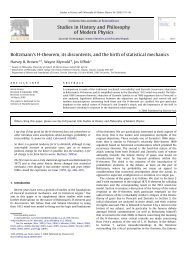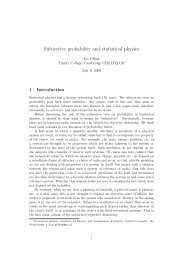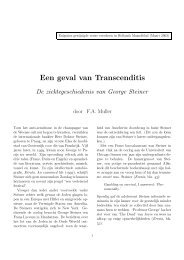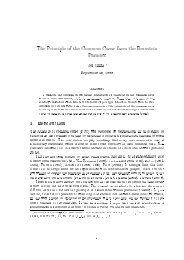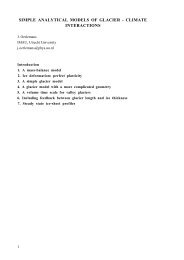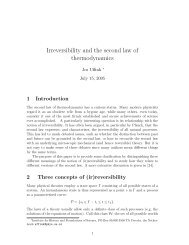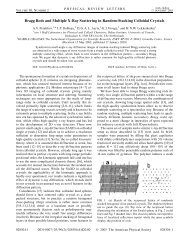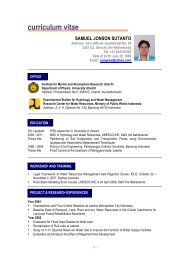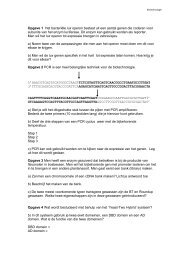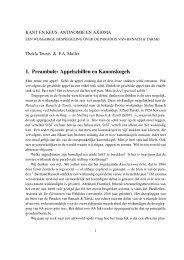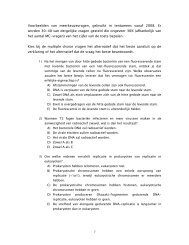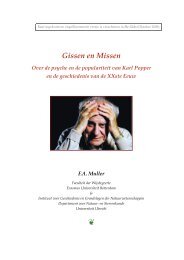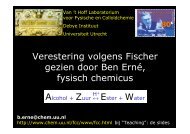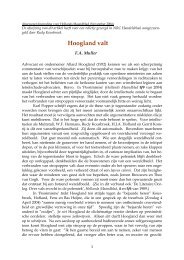FOUNDATIONS OF QUANTUM MECHANICS
FOUNDATIONS OF QUANTUM MECHANICS
FOUNDATIONS OF QUANTUM MECHANICS
Create successful ePaper yourself
Turn your PDF publications into a flip-book with our unique Google optimized e-Paper software.
156 CHAPTER VII. BELL’S INEQUALITIES<br />
The idea behind the requirement of outcome independence is that such a situation could only<br />
occur because the HVT was incomplete; in a complete specification of the state of the pair of particles<br />
which existed at the beginning of the trip also the color of the little balls should have been included,<br />
even though the travelers did not know the color of their little ball. Then it automatically follows,<br />
at given λ, that the little ball in New York is white and the observation in Tokyo provides no new<br />
information.<br />
2. Parameter independence, (VII. 62), means that the probability distribution of the outcomes<br />
at A is independent of external changes at B, e.g. pointing the spin meter. The argumentation leading<br />
to the assumption of parameter independence is generally associated with the possibility of signaling.<br />
Suppose that, for example, adjustments ⃗ b and ⃗ b ′ existed such that<br />
p ⃗a, ⃗ b<br />
(a | λ) ≠ p ⃗a, ⃗ b ′ (a | λ), (VII. 70)<br />
then, in principle, it is possible to instantaneously exchange signals between experimenters located<br />
at A and B. Since the experimenter located at B can choose if he points his spin meter in the<br />
direction ⃗ b or ⃗ b ′ , an experimenter located at A is able, if the source emits particle pairs in a pure<br />
hidden - variables state λ, to register the relative frequency of outcomes of A and thereby retrieve<br />
which adjustment has been chosen by the experimenter at B. Violation of parameter independence<br />
therefore means that the HVT enables the instantaneous exchange of signals over arbitrarily large<br />
distances.<br />
3. Source independence, (VII. 63), means that the probability distribution over the hidden variable<br />
describing the particle pair cannot depend on the measuring directions chosen by the experimenters.<br />
The argumentation leading to the assumption of source independence is often described<br />
in terms of the ‘free will’ of the experimenters. The experimenters are considered to be completely<br />
‘free’ in their decision how to point their spin meters, and even to make their choice just at the last<br />
moment, when the particles have long left the source. Therefore, the probability distribution ρ(λ),<br />
which characterizes the source of the particle pairs, cannot depend on that.<br />
Of course, here too it applies that violation of the requirement is logically conceivable. It is<br />
possible that this freedom does not exist, and that at emitting the particles, the directions in which<br />
the experimenters will measure have already been determined. It is also conceivable that by some<br />
other cause a correlation exists between λ and the directions ⃗a and ⃗ b, influencing both. The first case,<br />
in which all relevant factors of the EPR experiment are determined in advance and the experimenters<br />
have no free will, is called super - determinism. Therefore, in a super - deterministic HVT the Bell<br />
inequalities can be violated also.<br />
VII. 5. 2<br />
<strong>QUANTUM</strong> <strong>MECHANICS</strong> AS A STOCHASTIC HVT<br />
Exclusively giving probability statements concerning outcomes of measurements, a stochastic<br />
HVT conceptually differs less from quantum mechanics than other HVT’s. In fact we can, without<br />
objection, take quantum mechanics itself as an example of a stochastic HVT by identifying λ with the<br />
quantum mechanical state and Λ with the relevant Hilbert space. Since quantum mechanics does not<br />
satisfy the Bell inequalities, it is interesting to examine which of the aforementioned requirements is<br />
violated inevitably by quantum mechanics.



